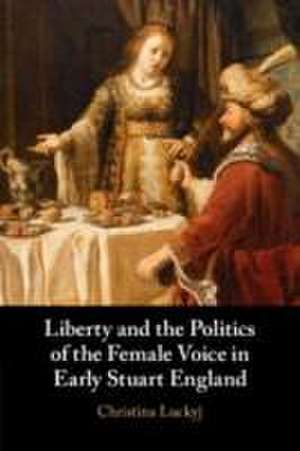Liberty and the Politics of the Female Voice in Early Stuart England
Autor Christina Luckyjen Limba Engleză Paperback – 28 feb 2024
| Toate formatele și edițiile | Preț | Express |
|---|---|---|
| Paperback (1) | 177.45 lei 3-5 săpt. | +15.16 lei 6-12 zile |
| Cambridge University Press – 28 feb 2024 | 177.45 lei 3-5 săpt. | +15.16 lei 6-12 zile |
| Hardback (1) | 583.91 lei 6-8 săpt. | |
| Cambridge University Press – 2 mar 2022 | 583.91 lei 6-8 săpt. |
Preț: 177.45 lei
Nou
Puncte Express: 266
Preț estimativ în valută:
33.97€ • 35.45$ • 28.48£
33.97€ • 35.45$ • 28.48£
Carte disponibilă
Livrare economică 20 februarie-06 martie
Livrare express 05-11 februarie pentru 25.15 lei
Preluare comenzi: 021 569.72.76
Specificații
ISBN-13: 9781108949521
ISBN-10: 1108949525
Pagini: 292
Dimensiuni: 152 x 229 x 16 mm
Greutate: 0.4 kg
Ediția:Nouă
Editura: Cambridge University Press
ISBN-10: 1108949525
Pagini: 292
Dimensiuni: 152 x 229 x 16 mm
Greutate: 0.4 kg
Ediția:Nouă
Editura: Cambridge University Press
Cuprins
1. The politics of the female voice; 2. Conscience and desire; 3. Elizabeth Cary and the 'publike-good'; 4. 'Not Sparing Kings:' Aemilia Lanyer; 5. Rachel Speght and the 'Criticall Reader'; 6. Mary Wroth and the politics of liberty; 7. 'Yokefellow, or Slave:' Anne Southwell.
Recenzii
'This is a fascinating piece of scholarship, which like all good books, points to something obvious that we have overlooked. In the extensive work done on voice, little attention has been paid to why male authors (and by extension readers too) in the period were so invested in the female voice. Rather than essentializing the female voice, this book will enable us to read female voices in more fully historicised and politicised terms. Christina Luckyj's deft and detailed analysis brings something genuinely new to our understanding of the key texts, positioning these writers within a culture of (mostly) Biblical reading and interpretation that focusses on politics in the widest sense. It will be a field-defining book.' Danielle Clarke, University College Dublin
